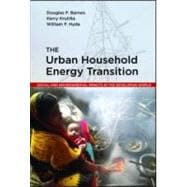
What is included with this book?
| Abbreviations, acronyms, energy conversion factors, and a note about data and tables | |
| Urban household energy, poverty, and the environment | p. 1 |
| The urban energy transition | p. 13 |
| Household fuel choice and consumption | p. 27 |
| Energy and equity : the social impact of energy policies | p. 41 |
| The urban energy transition and the environment | p. 56 |
| The energy transition in Hyderabad, India : a case study | p. 77 |
| Toward more effective urban energy policies | p. 102 |
| Table of Contents provided by Blackwell. All Rights Reserved. |
The New copy of this book will include any supplemental materials advertised. Please check the title of the book to determine if it should include any access cards, study guides, lab manuals, CDs, etc.
The Used, Rental and eBook copies of this book are not guaranteed to include any supplemental materials. Typically, only the book itself is included. This is true even if the title states it includes any access cards, study guides, lab manuals, CDs, etc.